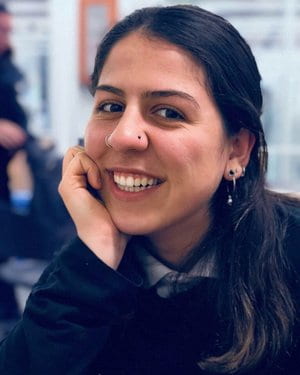So, what’s it like studying international development as the daughter of two refugee parents?
I feel lucky. I was born here in Canada and instantly became the first Canadian citizen before anyone else in my family, which was a big deal. As my parents and brother fled from the war-torn country of Kurdistan-Iraq in 1997, I grew familiar with the struggles they faced and continued to face as refugees in Canada. My parents were political activists in Kurdistan, and after multiple death threats and violent protests, they were forced to make a life or death decision — do they stay in Iraq and risk being murdered, or do they attempt to leave the country so they could provide a safe life for their children? It was evident that evacuating was the only option, but the hardship that comes with leaving your entire life and family behind is often an under-appreciated aspect of being a refugee. Despite all these challenges, my parents, like many other refugees, managed to rebuild their lives here in Canada, creating a more promising future for our entire family.
By sharing their stories of protesting against the Iraqi government, advocating for human rights, and committing to a lifestyle of activism with me as I was growing up — my parents played a substantial role in cultivating my passion towards international development. My mother, as a women’s rights activist, taught me that the normalization of female oppression within the Middle East was a systematic issue of underdevelopment and inequality, which is how I learned about the complex cultural roles of women in Iraq from a young age. While my socialist father educated me on the history of conflict in the Arab world, the Kurdish genocide, and the deep corruption within Iraq, I developed an understanding of the complex nature within Middle Eastern politics. By age 10, my father started engaging me in his political efforts, and as I was working with him to prepare refugee settlement applications — we sponsored over 50 families from Iraq, Eritrea, Syria, and Turkey to come to Canada. Picking up clear insights as a child, I did not register that my peers could not relate to my experiences and that my upbringing was relatively different than those who did not come from refugee families.
I was fortunate enough to spend a lot of my childhood living in my family’s home in Iraq, even visiting countries such as Turkey and Syria. I have only recently recognized that these experiences have deeply conditioned my perception of the world, and growing up as a girl from Kurdistan-Iraq, I had a lot to learn and unlearn. I feel a social responsibility to dismantle the negative connotations associated with the Middle East, and bring forth a positive reputation for Arab refugees and migrants when these issues come up in day-to-day life. Jennifer Utz, a well-known video journalist, is a prime example of someone who does this. Jennifer composed an article that focuses specially on breaking apart from the stereotypes of people from the Middle East.
Watching the news in Canada during my youth, I witnessed the media paint my homeland as violent and sinister, however, I did not perceive Iraq to be as insidious as Western television broadcasted the country to be. To me, Kurdistan was full of rich culture, kind-hearted people, great food, and mountainous landscapes, so when the invasion of Iraq in 2003 struck the news, I spent the next few years of my life convinced that where I was from was no longer beautiful. After visiting Kurdistan a few more times, I began to realize that the media coverage of the Middle East within North America was often not thoughtful or accurate.
Yet, as a University of Guelph student studying international development, I feel that my experiences have equipped me with a unique perspective on global issues within my studies — especially in regards to the Middle East and issues of refugees. While my fellow students are learning about theories around drivers of displacement in the abstract sense, I can understand it through the lived experiences of my family. I try my best to bring my experiences to the classroom because I feel they are important to make what we read on the pages real. Coming from a refugee family and aiding in the resettlement of many refugee families, my goal is to study international development so I can contribute to creating pragmatic solutions on a local and global scale to address refugee and migrant crises. Due to my upbringing, I am able to relate on a personal level to the connections made between the social, political, and economic components within development. Holding the natural capacity to consider cultural factors that come into place within an international conflict, I can be multifaceted in my approach to political matters.
Again, I feel lucky. I am thankful for the way my parents educated and raised me, as they have paved the way for me to acquire tools that I can use to further my contribution to global development. As what I have learned throughout my life can be taught to those who want to understand, I can influence a new pattern of learning for students with similar pursuits as myself. It’s been five years since I last visited my homeland of Kurdistan, and although I miss it, my perspectives and experiences in International Development never fail to trace me back to Iraq.

Shilik Hamad is a current undergraduate student studying International Development with a minor in Economics at the University of Guelph. Her studies of interest include refugee/migration resettlement, poverty, development economics, food security, and inequality. Her focus is on development within the Middle East, as well as civil war induced refugee crises and internal displacement issues.

